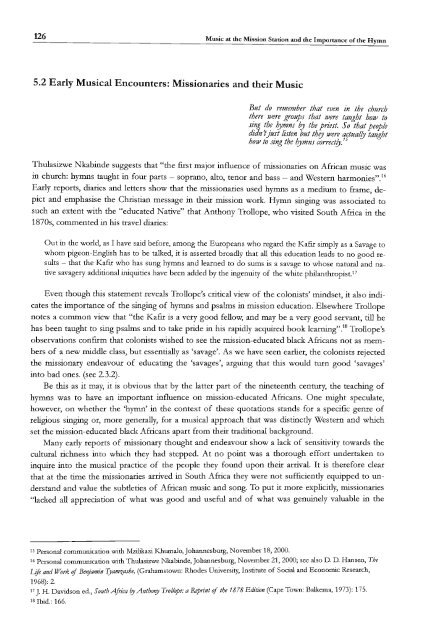South African Choral Music (Amakwaya): Song, Contest and the ...
South African Choral Music (Amakwaya): Song, Contest and the ...
South African Choral Music (Amakwaya): Song, Contest and the ...
You also want an ePaper? Increase the reach of your titles
YUMPU automatically turns print PDFs into web optimized ePapers that Google loves.
126 <strong>Music</strong> at <strong>the</strong> Mission Station <strong>and</strong> <strong>the</strong> Importance of<strong>the</strong> Hymn<br />
5.2 Early <strong>Music</strong>al Encounters: Missionaries <strong>and</strong> <strong>the</strong>ir <strong>Music</strong><br />
But do remember that even in <strong>the</strong> church<br />
<strong>the</strong>re were groups that were taught how to<br />
sing <strong>the</strong> I?Jmns I:ry <strong>the</strong> priest. So that people<br />
didn'tjust listen but thry were aftualfy taught<br />
how to sing <strong>the</strong> I?Jmns correctfy.!)<br />
Thulasizwe Nkabinde suggests that "<strong>the</strong> first major influence of missionaries on <strong>African</strong> music was<br />
in church: hymns taught in four parts - soprano, alto, tenor <strong>and</strong> bass - <strong>and</strong> Western harmonies".16<br />
Early reports, diaries <strong>and</strong> letters show that <strong>the</strong> missionaries used hymns as a medium to frame, de<br />
pict <strong>and</strong> emphasise <strong>the</strong> Christian message in <strong>the</strong>ir mission work. Hymn singing was associated to<br />
such an extent with <strong>the</strong> "educated Native" that Anthony Trollope, who visited <strong>South</strong> Africa in <strong>the</strong><br />
1870s, commented in his travel diaries:<br />
Out in <strong>the</strong> world, as I have said before, among <strong>the</strong> Europeans who regard <strong>the</strong> Kafir simply as a Savage to<br />
whom pigeon-English has to be talked, it is asserted broadly that all this education leads to no good results<br />
- that <strong>the</strong> Kaflt who has sung hymns <strong>and</strong> learned to do sums is a savage to whose natural <strong>and</strong> native<br />
savagery additional iniquities have been added by <strong>the</strong> ingenuity of <strong>the</strong> white philanthropist.l7<br />
Even though this statement reveals Trollope's critical view of <strong>the</strong> colonists' mindset, it also indi<br />
cates <strong>the</strong> importance of <strong>the</strong> singing of hymns <strong>and</strong> psalms in mission education. Elsewhere Trollope<br />
notes a common view that "<strong>the</strong> Kafir is a very good fellow, <strong>and</strong> may be a very good servant, till he<br />
has been taught to sing psalms <strong>and</strong> to take pride in his rapidly acquired book learning".18 Trollope's<br />
observations confirm that colonists wished to see <strong>the</strong> mission-educated black <strong>African</strong>s not as members<br />
of a new middle class, but essentially as 'savage'. As we have seen earlier, <strong>the</strong> colonists rejected<br />
<strong>the</strong> missionary endeavour of educating <strong>the</strong> 'savages', arguing that this would turn good 'savages'<br />
into bad ones. (see 2.3.2).<br />
Be this as it may, it is obvious that by <strong>the</strong> latter part of <strong>the</strong> nineteenth century, <strong>the</strong> teaching of<br />
hymns was to have an important influence on mission-educated <strong>African</strong>s. One might speculate,<br />
however, on whe<strong>the</strong>r <strong>the</strong> 'hymn' in <strong>the</strong> context of <strong>the</strong>se quotations st<strong>and</strong>s for a specific genre of<br />
religious singing or, more generally, for a musical approach that was distinctly Western <strong>and</strong> which<br />
set <strong>the</strong> mission-educated black <strong>African</strong>s apart from <strong>the</strong>ir traditional background.<br />
Many early reports of missionary thought <strong>and</strong> endeavour show a lack of sensitivity towards <strong>the</strong><br />
cultural richness into which <strong>the</strong>y had stepped. At no point was a thorough effort undertaken to<br />
inquire into <strong>the</strong> musical practice of <strong>the</strong> people <strong>the</strong>y found upon <strong>the</strong>ir arrival. It is <strong>the</strong>refore clear<br />
that at <strong>the</strong> time <strong>the</strong> missionaries arrived in <strong>South</strong> Africa <strong>the</strong>y were not sufficiently equipped to underst<strong>and</strong><br />
<strong>and</strong> value <strong>the</strong> subtleties of <strong>African</strong> music <strong>and</strong> song. To put it more explicitly, missionaries<br />
"lacked all appreciation of what was good <strong>and</strong> useful <strong>and</strong> of what was genuinely valuable in <strong>the</strong><br />
15 Personal communication with Mzilikazi Khumalo,Johannesburg, November 18, 2000.<br />
16 Personal communication with Thulasizwe Nkabinde,Johannesburg, November 21, 2000; see also D. D. Hansen, The<br />
Ltfe <strong>and</strong> Work t1 Be1yami11 IjJamzashe, (Grahamstown: Rhodes University, Institute of Social <strong>and</strong> Economic Research,<br />
1968): 2.<br />
17 J. H. Davidson ed., <strong>South</strong> Africa l?JAntho1!J! Trollope: a Reprint t1 <strong>the</strong> 1878 Edition (Cape Town: Balkema, 1973): 175.<br />
18 Ibid.: 166.

















